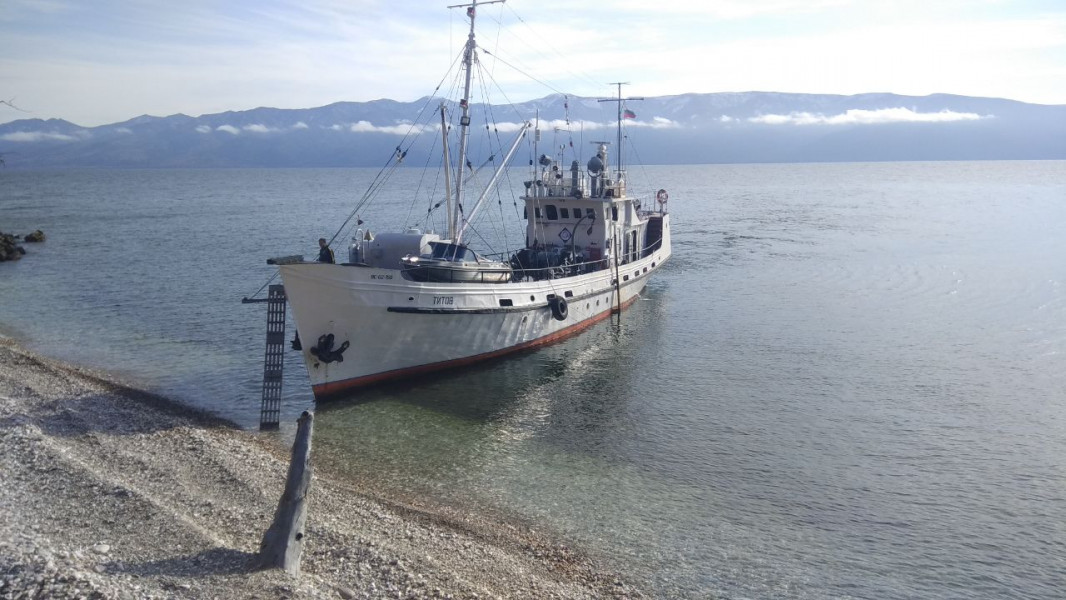The 2023 navigation season is completed
The navigation season of research works on Baikal came to an end in LIN SB RAS. The final expedition took place on October 20-30 on the board R/V “Titov” within the state assignment “Study of advective and turbulent water exchange of Lake Baikal and its impact on the lake ecosystem, risks of catastrophic events” (0279-2021-0004) (led by I.A. Aslamov) and “Assessment of environmental and economic aspects of the impact on Lake Baikal from existing and planned anthropogenic factors in the Baikal natural area, rational nature management, water and bio-resource potential of Lake Baikal” (0279-2022-0004) (led by M. Makarov). The main purpose of these expeditions is to study the spatial variability of hydrophysical parameters, search for new and monitoring of known gas outlets. CTD soundings were carried out at 50 stations of longitudinal and transverse transects. With the main works along the course of the research vessel, temperature, conductivity, pH, ORP and turbidity in the surface layer were continuously recorded. Continuous echo sounder surveys were carried out to analyze the sound scattering layer and monitor gas outlets.
There was maintenance and repair of environmental monitoring stations installed at Cape Elokhin, Uzury Bay, and Maly Ushkaniy Island. A search operation was carried out to locate and raise an anchor.
In total, 35 expeditions were carried out during the navigation period of 2023 under 10 “Basic” projects and 1 prospecting project of the state assignment of LIN SB RAS, as well as 5 RNF grants. Four research vessels of LIN SB RAS (R/V “Akademik Koptug”, R/V “G.Yu. Vereshchagin”, R/V “Titov”, R/V “Papanin”) were involved in the expeditionary works. The total duration of the expeditions was 265 vessel days. The expedition teams included scientists and students from 13 Russian organizations: IAO SB RAS, IEC SB RAS, API ISU, RSHU, IPMS SB RAS, Research Institute of Biology ISU, ISMU, IMCB SB RAS, FENU, NSU, MSU, ISU, ICG SB RAS.
As part of ecological monitoring, complex expeditions were carried out to study abiotic and biotic components of the Baikal ecosystem in spring and autumn periods, to identify patterns of their spatial-temporal dynamics, as well as to study experimentally mechanisms and processes affecting the distribution and cycling of matter in the water column, taking into account temperature-density anomalies of deep natural waters under the conditions of modern climate change, to study the distribution and transfer of physical and chemical characteristics (oxygen, biogenic elements) in the water column, and water-atmosphere gas exchange.
From June 19 to 30, the scientific and educational expedition “Baikal—Natural Laboratory” took place, which was attended by schoolchildren of 7–10 grades from Irkutsk, Bratsk, and Krasnoyarsk. The event was held within the project “Scientific Potential of Siberia” and was supported by the Presidential Grants Fund.
From July 31 to August 3, within the memorandum on cooperation in the field of research in limnology and geology in East Asia, the Russian-Chinese expedition of LIN SB RAS, IEC SB RAS, Chinese Geological University, and Nanjing Institute of Geography and Limnology CAS took place on board the R/V “G.Yu. Vereshchagin”.
On August 15–22, the all-Russian expedition Floating University “Baikal-Evolution” took place, where young researchers had an opportunity to improve their skills and get acquainted with the most relevant methods of research on the biodiversity of natural objects and modern concepts of the theory of adaptive evolution.
The expeditions in 2023 involved 96 researchers (of whom 31 were under 39), 18 foreign representatives, 15 students and postgraduates, and 20 schoolchildren.
















